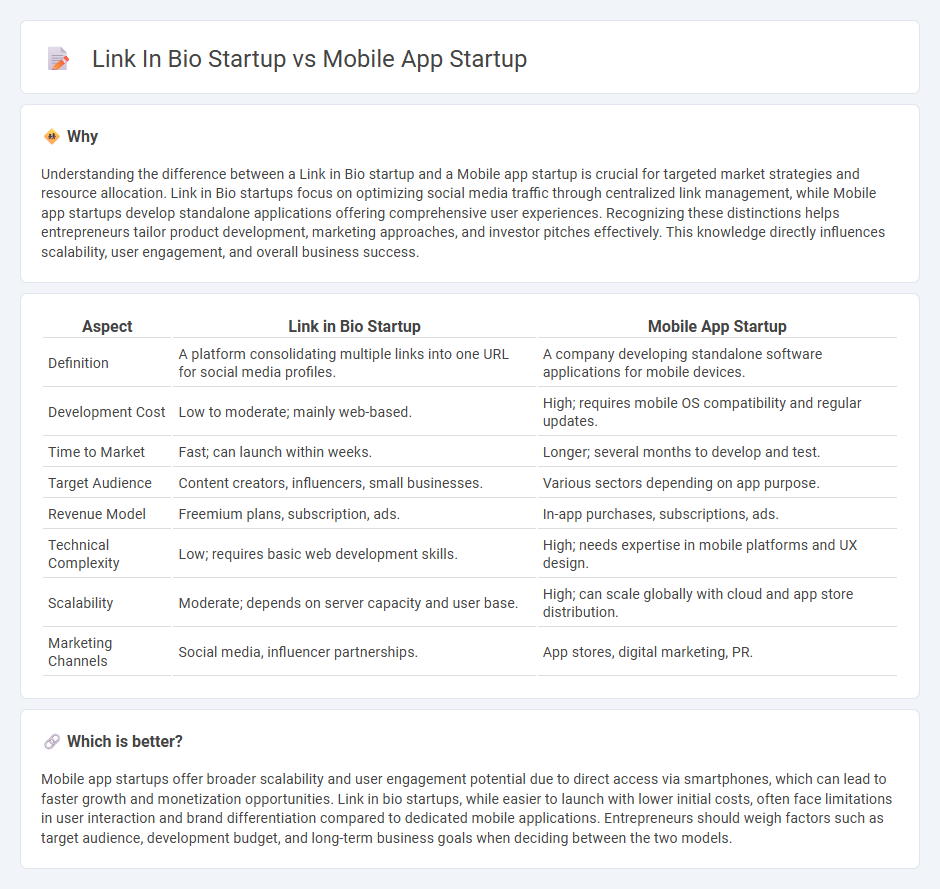
Entrepreneurship in the tech sector often focuses on Link in Bio startups, which streamline online presence by consolidating multiple digital links into a single, shareable page, optimizing user engagement and brand visibility. Mobile app startups, however, develop specialized software for smartphones, targeting diverse user needs through innovation and personalized experiences to capture market share. Explore the key differences and growth strategies of these startup models to enhance your entrepreneurial journey.
Why it is important
Understanding the difference between a Link in Bio startup and a Mobile app startup is crucial for targeted market strategies and resource allocation. Link in Bio startups focus on optimizing social media traffic through centralized link management, while Mobile app startups develop standalone applications offering comprehensive user experiences. Recognizing these distinctions helps entrepreneurs tailor product development, marketing approaches, and investor pitches effectively. This knowledge directly influences scalability, user engagement, and overall business success.
Comparison Table
| Aspect | Link in Bio Startup | Mobile App Startup |
|---|---|---|
| Definition | A platform consolidating multiple links into one URL for social media profiles. | A company developing standalone software applications for mobile devices. |
| Development Cost | Low to moderate; mainly web-based. | High; requires mobile OS compatibility and regular updates. |
| Time to Market | Fast; can launch within weeks. | Longer; several months to develop and test. |
| Target Audience | Content creators, influencers, small businesses. | Various sectors depending on app purpose. |
| Revenue Model | Freemium plans, subscription, ads. | In-app purchases, subscriptions, ads. |
| Technical Complexity | Low; requires basic web development skills. | High; needs expertise in mobile platforms and UX design. |
| Scalability | Moderate; depends on server capacity and user base. | High; can scale globally with cloud and app store distribution. |
| Marketing Channels | Social media, influencer partnerships. | App stores, digital marketing, PR. |
Which is better?
Mobile app startups offer broader scalability and user engagement potential due to direct access via smartphones, which can lead to faster growth and monetization opportunities. Link in bio startups, while easier to launch with lower initial costs, often face limitations in user interaction and brand differentiation compared to dedicated mobile applications. Entrepreneurs should weigh factors such as target audience, development budget, and long-term business goals when deciding between the two models.
Connection
Link in bio startups and mobile app startups are connected through their shared focus on enhancing digital presence and user engagement for businesses and individuals. Both leverage mobile technology to streamline access to multiple digital assets, allowing users to consolidate social media links, e-commerce stores, and multimedia content into a single, easy-to-navigate interface. This integration boosts brand visibility and conversion rates by enabling seamless interaction between audiences and entrepreneurial platforms.
Key Terms
**Mobile app startup:**
Mobile app startups typically emphasize developing scalable applications with user-friendly interfaces tailored for iOS and Android platforms to capture a broad audience. They prioritize integrating features such as push notifications, in-app purchases, and real-time user analytics to enhance engagement and retention rates. Explore comprehensive strategies for mobile app startup success to optimize growth and market presence.
User Acquisition
Mobile app startups often leverage targeted app store optimization, in-app referral programs, and social media advertising to drive user acquisition efficiently. Link in bio startups prioritize seamless integration with popular social platforms, optimizing click-through rates by enhancing user experience and personalization. Discover effective strategies tailored to your startup's growth by exploring in-depth user acquisition techniques.
App Store Optimization (ASO)
Mobile app startups must prioritize App Store Optimization (ASO) by targeting relevant keywords, optimizing app titles and descriptions, and leveraging user reviews to enhance visibility and downloads within app stores. Link in bio startups benefit from ASO strategies by integrating optimized micro landing pages and ensuring seamless mobile user experiences to capture organic traffic from social platforms. Discover deeper insights on how tailored ASO tactics can accelerate growth for both mobile app and link in bio startups.
Source and External Links
Create a Mobile App Startup With Key Strategies - Appinventiv - This article outlines the essential steps for launching a mobile app startup, including finalizing your idea, conducting market research, choosing platforms, designing UI/UX, developing the product, raising investment, strategizing marketing, monetization, and retention plans.
Startup App Developers (2024) - Business of Apps - This guide covers defining your mobile app strategy, planning and analysis, UX design, and highlights the benefits of having a startup app like engaging younger audiences and maximizing ROI, along with tips on working with specialized app developers.
Should You Build a Mobile App or a Website for Your Startup? - This resource helps decide between developing a mobile app or web app for your startup based on product goals, user needs, offline capabilities, budget, and access to native phone features, with examples from successful companies.
 dowidth.com
dowidth.com